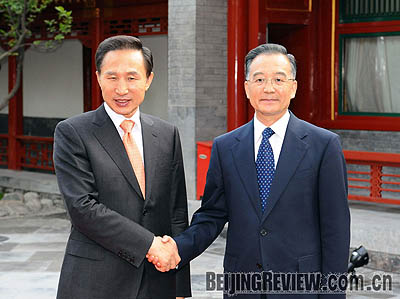|

HIGH-LEVEL TALKS: Chinese Premier Wen Jiabao meets visiting South Korean President Lee Myung Bak in Beijing on May 28
What implications can a change in wording have for two countries' relations? During South Korean President Lee Myung Bak's recent eastward visit, China and South Korea announced they were upgrading their "comprehensive cooperative partnership" to a "strategic cooperative partnership."
The redefinition of their bilateral relations shows the importance the two countries are attaching to their partnership, and that is bound to lead to concrete improvements in these relations, Chinese international affairs experts say. Although the new South Korean Government has adjusted the country's foreign policy by cuddling up to the United States, China will continue to be one of the priorities of its diplomatic strategy, they say.
Lee paid his first state visit to China on May 27-30. After meeting Chinese leaders in Beijing, he toured Qingdao, a coastal city in east China's Shandong Province that is geographically near South Korea and hosts a large number of South Korean-funded companies. Lee also went to Dujiangyan in Sichuan Province to console those who have suffered from the May 12 Wenchuan earthquake, becoming the first foreign head of state to visit China's quake-hit areas.
A visit that touches hearts
"The relations between China and South Korea have been developing well," said Zhang Liangui, a professor specializing in Northeast Asia studies at the Party School of the Central Committee of the Communist Party of China. "But without being defined as ‘strategic,' the two countries' relations did not seem to be as close as they should be. A strategic partnership underlines across-the-board cooperation, meaning that two countries' political, economic, cultural and military ties should advance side by side. So it not only is a change in wording, but also will result in substantial progress in China-South Korea relations."

COMMON TOUCH: South Korean President Lee Myung Bak visits primary school students at a temporary shelter in earthquake-hit Dujiangyan, Sichuan Province, on May 30
Lee's visit to China was deemed a success also because his journey to the quake-hit areas helped imbue ordinary Chinese people with a sense of gratitude toward South Korea, thereby cementing the two nations' bonds, Zhang said.
While holding talks with Lee, Chinese President Hu Jintao spoke highly of the development of the two countries' relations over the past 16 years. Since they established diplomatic relations in 1992, they have pushed their bilateral ties to "one new level after another" with frequent high-level exchanges and deepening political trust, Hu said.
The two countries have had increasingly closer trade ties as well. Their bilateral trade volume reached $159.9 billion in 2007, an increase of 19.1 percent over the previous year, according to China Customs data. China's exports to and imports from South Korea totaled $56.14 billion and $103.76 billion, respectively, while its trade deficit stood at $47.62 billion.
| 